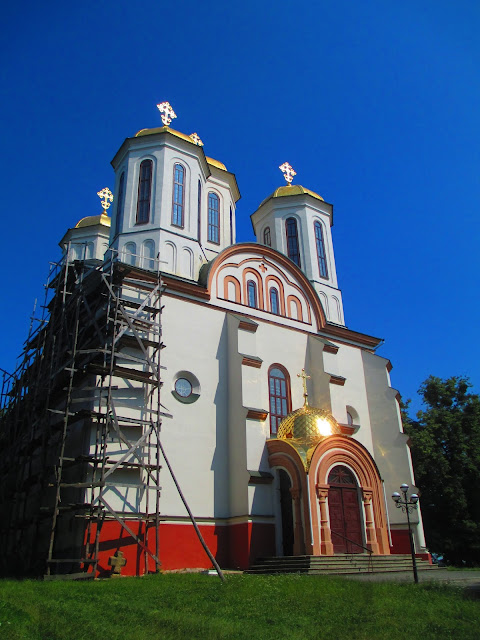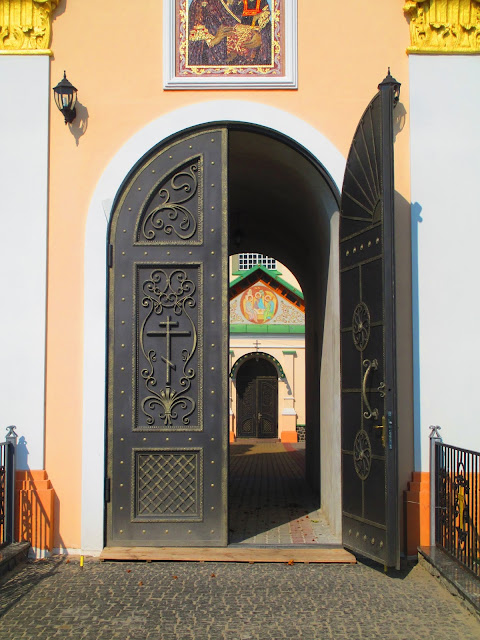One of my students had an assignment to interview one of his instructors about their research. He chose me. I wrote the responses to this late last night after a long day of grant writing. I hope he enjoyed my tired humor.
So in case you ever wondered about my research, here you go.
1. Q. What is the research you are doing and what do you hope to accomplish by doing this research? Within what field is this research?
A. Currently, I'm planning to do dissertation research in the city of Lviv, Ukraine. I will be analyzing the discourse (the talk) around the architectural development of four sites throughout the city, as well as the evolution of the sites themselves. My goal is to better understand how Ukrainians think about themselves as a nation, how they think about Lviv as a Ukrainian city, and how they perform these identities with respect to the landscape (what structures do they keep, which do they destroy, which do they memorialize, and how?)
This research is in the field of Human Geography. If you want to get more specific, it's a combination of critical geopolitics and landscape studies using research methods that originated in anthropology. It could also be considered to be in Central/East European Area Studies.
2. Q. Why did you choose this particular subject for your research and how long have you been doing this research/been in your particular field of study?
A. I'm just starting out in this field, really. My first real research project was my Master's thesis, which I wrote in 2011-2012. I've been studying Geography since 2010, although I did minor in it during college-- and the research that I do also incorporates a lot that I learned during my undergraduate years studying Linguistics.
I chose this particular subject for this research because I love Ukraine, and I'm fascinated by the idea of national identity and the fact that so much of our lives is determined by things like nationality and citizenship which, when it comes down to it, don't really exist except in the minds of people. I want to know how the world works so that I can help improve it.
So in case you ever wondered about my research, here you go.
1. Q. What is the research you are doing and what do you hope to accomplish by doing this research? Within what field is this research?
A. Currently, I'm planning to do dissertation research in the city of Lviv, Ukraine. I will be analyzing the discourse (the talk) around the architectural development of four sites throughout the city, as well as the evolution of the sites themselves. My goal is to better understand how Ukrainians think about themselves as a nation, how they think about Lviv as a Ukrainian city, and how they perform these identities with respect to the landscape (what structures do they keep, which do they destroy, which do they memorialize, and how?)
This research is in the field of Human Geography. If you want to get more specific, it's a combination of critical geopolitics and landscape studies using research methods that originated in anthropology. It could also be considered to be in Central/East European Area Studies.
2. Q. Why did you choose this particular subject for your research and how long have you been doing this research/been in your particular field of study?
A. I'm just starting out in this field, really. My first real research project was my Master's thesis, which I wrote in 2011-2012. I've been studying Geography since 2010, although I did minor in it during college-- and the research that I do also incorporates a lot that I learned during my undergraduate years studying Linguistics.
I chose this particular subject for this research because I love Ukraine, and I'm fascinated by the idea of national identity and the fact that so much of our lives is determined by things like nationality and citizenship which, when it comes down to it, don't really exist except in the minds of people. I want to know how the world works so that I can help improve it.
3. Q. How did you come up with this idea or hypothesis for your research?
A. The short answer? Tons and tons of reading, plus being curious and adventurous.
The long answer? I've spent many years studying geopolitics (which is the study of power relationships in relation to space) and recently also started studying landscape (how humans change the shape of the land they inhabit to reflect those power relationships). I've also been interested in Ukraine since my first trip there in 2010, and I've done a lot of research on the region and spent a lot of time there. This past summer, I was in Lviv studying Ukrainian, when someone told me the story of the empty lot in the center of town where they wanted to build a hotel, but couldn't because first people in town hated the plan for it because it was ugly and didn't fit in with the city's architecture, and then they discovered on the site the foundation of a building from the 16th-17th century and so had to stop until archaeological excavation of the lot could be completed. I got to thinking about it, and started connecting it in my head with other fascinating stories of land-use history I'd heard in bits and pieces over my time there. I guess something just clicked, and I realized that there was a cohesive question there that I could study using precisely all the tools I'd learned in school.
4. Q. How have you implemented the scientific method in your research?
A. People say it's fuzzier in the social sciences, but it's not really. We just have to allow for more complexity in the answers, and give the information we give with a lot of caveats, because humans are complicated. But it's the same basic process. I start with a question, make some hypotheses (with the realization that the data will reveal more than I can possibly predict), collect my data, analyze it, and draw conclusions. The only difference is that because the data I'm analyzing is speech and I'm trying to research things like feelings and beliefs, there is a lot of interpretation involved. But that's not to say that the conclusions can't still be valuable, if the researcher really knows what they're doing, and are careful to advise any reader about any biases that might have affected their research without their realizing it.
5. Q. What/who has made your research in this field possible?
A.Gosh. So many people. My grandma and parents who funded my college education. My Geography advisor at the University of Cincinnati, who encouraged me to pursue a minor and then a Master's degree in geography, and introduced me to the areas of geography that I find most interesting. My current advisor, who gave me the position I have in IU's geography department and who serves as my mentor in all things research-related, and all the professors I've worked with over the years, learning how to do research properly. Ukrainian Catholic University in Lviv, the Fulbright program at the U.S. Department of State, and the Foreign Language and Area Studies program (title VIII grants, also from the State Department) that have supported all my trips to Ukraine. Harvard University's Ukrainian Summer Institute that gave me free tuition to study Ukrainian there last summer. All of my friends and colleagues who encourage me when I get stressed out and overwhelmed, especially my best friend who helps me proofread all my grant applications. Oh, and a ton of really hard work by yours truly. Thanks, me!
6. Q. What has contributed to your success in your field so far?
A. One word: perseverance. I really, really wanted to learn more about Ukraine, to immerse myself in the place and culture as much as possible, and I was willing to do whatever it took to get me there. I applied for every grant I could find to go back to Ukraine. The first year I applied, I didn't get any. I was crushed, but I didn't let it stop me. The next year I applied for them all again, and lo and behold got a Fulbright grant (which in case you didn't know, is pretty darn prestigious). Once I'd gotten that, I realized that I could do anything if I tried hard enough and didn't quit just because I failed once. Since then I've had a lot more setbacks-- on my first couple of visits to Ukraine, I struggled with culture shock, and upon returning home, reverse culture shock. Just getting the language training I wanted, even while living in Ukraine, was often difficult. There were other grants I didn't get, there were funds that were pulled because of security issues when the war started, there were Ukrainian language programs cancelled due to lack of enrollment. Generally, I just say to myself that I'm not going to let it stop me, and I find another way. It's worked for me pretty well so far.
7. Q. What has been the most challenging part of your research so far?
A. Vladimir Putin. No, but really. See above.
Ironically, I was interested in studying geopolitics in Ukraine, and it was precisely Ukraine's geopolitics that have caused me the most trouble. Having a revolution, and then a war, break out in your study site is not the ideal situation, even if it does make people suddenly care about what you do. It makes it hard to physically access the study site, and affects funding as well. Finding opportunities for language training in a less common language has also been really tough. I've had to fight to find programs and funding. I've also had to sacrifice a lot of time. I've given countless hours to writing grant applications, studying, and learning languages. That's why I'd never recommend graduate school to anyone who doesn't really, *really* want it. If you don't enjoy what you do, you will definitely burn out and be miserable. Even those of us who love what we do still occasionally get stressed and overwhelmed. But for me, I get to have adventures and meet interesting people, and that makes it all worth it.








































































